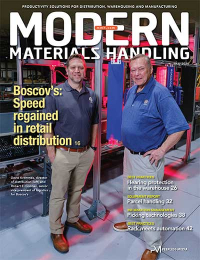Study identifies best approaches to survive supply chain complexity
Joint APICS and Michigan State University study offers solutions to a major industry challenge.
Latest Material Handling News
MHEFI awards record-breaking $231,700 in scholarships to 61 students Women in Manufacturing Association to offer 4th annual Moms in MFG Conference Student Day: Students unlock their futures at Modex 2024 Women in Manufacturing Association announces 2024 Board of Directors The reBound Podcast: Looking for talent in all the right places: How Essendant is revolutionizing recruitment More EducationAPICS, a professional association for supply chain management, and Michigan State University (MSU), have announced findings from their latest report, “Managing the Complexity Paradigm.”
The new report addresses the increased complexity of today’s supply chain flow, which supply chain leaders cite as the top challenge they face. Omni-channel marketing has opened several new flows to the marketplace (direct from manufacturer, through distributors, and direct to home), and consumers are looking for more customized products. The report discusses the balance between managing complexity that can increase cost but also has the potential to increase revenue. This is the fourth report released in APICS and MSU’s Beyond the Horizon research project, which aims to identify and provide solutions to the most pressing issues facing supply chain managers.
“The partnership between MSU and APICS enables us to gain insights into the needs of supply chain professionals and their employers and provide them with content that solves real-world problems,” said APICS CEO Abe Eshkenazi, CSCP, CPA, CAE. “The newest Beyond the Horizon report provides individuals and organizations with meaningful research around supply chain complexity, a framework for understanding its drivers, and insights into how to effectively manage it.”
For this report, APICS and MSU gathered data via comprehensive interviews with 50 global supply chain firms. The research found that firms are experiencing increased complexity due to a constantly growing number of products, customers, channels, and geographies. The four primary sources of supply chain complexity are summarized as:
Customer Accommodation: Customers expect ever-increasing speed and visibility of process, and variety and customization of products.
Operations Globalization: As supply chains expand into more varied global customer markets, substantial variations in existing supply chain processes must occur.
Supplier Complexity: Globalization means developing and maintaining strategies to overcome the complex and often serious issues associated with local sourcing.
General Business and Supply Chain Trends: The industry push to omnichannel supply chains is exacerbated by day-to-day business concerns, like technology turnover or company mergers.
In addition to investigating the nature of complexity-related issues affecting supply chains, the researchers also asked study participants how they were tackling complexity in the supply chain flow. Finding ways to avoid and preemptively mitigate complexity was the leading strategy reported, as well as relying upon collaborative partnerships, integrating modern information technology, engaging leadership and establishing more flexible operations.
“Managing the Complexity Paradigm” is part of Supply Chain Management: Beyond the Horizon, a multi-year research project conducted by MSU’s Eli Broad School of Business and supported by the APICS Supply Chain Council and the John H. McConnell Chair in Business Administration at MSU.
Download the Report: Managing the Complexity Paradigm

Article Topics
Education News & Resources
MHEFI awards record-breaking $231,700 in scholarships to 61 students Women in Manufacturing Association to offer 4th annual Moms in MFG Conference Student Day: Students unlock their futures at Modex 2024 Women in Manufacturing Association announces 2024 Board of Directors The reBound Podcast: Looking for talent in all the right places: How Essendant is revolutionizing recruitment Modex 2024: Gain new knowledge at on-floor seminars Manufacturing Institute releases report on transitioning military-affiliated talent into manufacturing More EducationLatest in Materials Handling
ISM May Semiannual Report signals growth in 2024, at a reduced rate 11th annual National Forklift Safety Day to be hybrid event, on June 11 PAC Machinery announces leadership transition Motion Industries to acquire automation company Automate 2024 heavy on smart warehouse robotics Lift Trucks & Accesories: The Trusted Workhorse Evolves Automate & Accelerate: Replacing Pick-to-Light with the Next Generation of Automation More Materials HandlingSubscribe to Materials Handling Magazine

Find out what the world's most innovative companies are doing to improve productivity in their plants and distribution centers.
Start your FREE subscription today.
May 2024 Modern Materials Handling

Latest Resources










